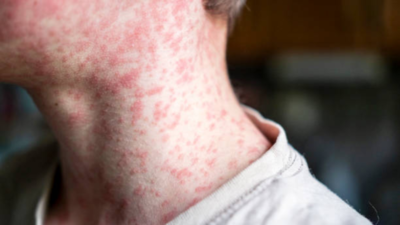ARTICLE AD BOX

As summer travel plans ramp up, here’s a heads-up: measles is bouncing back in 2025, and it’s well-traveled. From North America to Europe, Asia to the Americas, this highly contagious virus is showing up in hotspots you might be visiting.
Whether you’re headed to Grandma’s house or backpacking through Europe, it’s smart to know where measles is flaring and how to stay protected.
North America on high alert
The United States is in the middle of its worst measles outbreak since 1992, with over 1,288 confirmed cases across 39 states as of July 9, 2025. Texas is ground zero, with West Texas alone reporting 753 cases, and sadly, at least three deaths have been linked to this outbreak. Canada is also struggling: 227 cases recorded by early March, with provinces like Ontario and Quebec affected — a travel health notice cautioning all outbound Canadians followed.That adds up to a big warning: if you’re traveling in or out of North America right now, double-check your MMR (measles, mumps, rubella) shots — at least two doses for those born after 1970 — because one trip could land you in quarantine.
Europe: Holiday hotspots under watch
Europe is in the thick of a measles resurgence. In April alone, health officials reported nearly 1,000 cases across 29 countries, including Romania, Netherlands, France, Belgium, and Spain.
Between May 2024 and April 2025, the European Centre for Disease Prevention and Control logged 22,481 cases, with serious complications and deaths, mostly among the unvaccinated young.Ireland’s HSE has issued stark warnings to travelers: get both doses of MMR at least two weeks before departure.
Americas: Still a hot zone
The WHO’s April report flagged 2,318 measles cases in the Americas from January through April 2025 — an 11-fold spike year-over-year. The bulk of cases have been in Canada, the U.S., and Mexico, with isolated outbreaks also seen in Argentina and Belize Belize even registered its first local measles cluster since 1991, tracing the original case back to travelers returning from Mexico.
It’s a global game of tag, where an unseen measles carrier can spark a community outbreak in a place that had long believed it was protected.
Travel risks & safety tips
Why travelers are vulnerable
Travelers are often exposed in crowded airports, buses, and hotels. There have been actual cases tied to airports—like Denver International and JFK—where exposure at baggage claim or boarding lounges has prompted public health alerts .
How to travel smart
First, get yourself MMR-vaccinated. For most adults, two doses are all it takes to protect you around 97% of the time.
Infants heading to high-risk zones may even get a dose as early as six months, followed by the full series later.Beyond vaccines, stay alert: if you show symptoms—fever, rash, cough—during travel, wear a mask and contact health staff immediately. Wash hands often, and steer clear of crowded spots if possible .Got exposed mid-trip? Some countries might give an MMR booster within 72 hours or even offer immunoglobulin within six days as post-exposure protection.
After coming home, watch for symptoms for up to 21 days and avoid mingling with vulnerable people if in doubt .Measles travels with you. It spreads in airport lounges just as easily as it does at international festivals. But the good news is simple: one shot, or preferably two, can ride shotgun with you wherever you go. If you’re planning to travel in 2025—whether home or abroad—checking your MMR status isn’t just smart. It’s essential.Disclaimer: This article is for informational purposes only and does not constitute medical advice. Always consult a qualified healthcare professional before making decisions about vaccinations, travel, or health precautions. Measles outbreaks and travel advisories can change rapidly—refer to official sources such as the World Health Organization (WHO), Centers for Disease Control and Prevention (CDC), or your country’s health department for the most current updates. The information provided here is accurate at the time of writing but may not reflect the latest developments.



.png)
.png)
.png)
















 2 days ago
6
2 days ago
6









 English (US) ·
English (US) ·